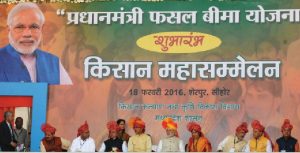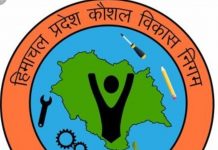 The Union Cabinet, chaired by the Prime Minister, Narendra Modi has proposed to modify certain parameters/provisions of ongoing schemes of PMFBY and RWBCIS. Under the new provisions, the allocation of business to Insurance Companies would be done for three years (Both for PMFBY/RWBCIS).
The Union Cabinet, chaired by the Prime Minister, Narendra Modi has proposed to modify certain parameters/provisions of ongoing schemes of PMFBY and RWBCIS. Under the new provisions, the allocation of business to Insurance Companies would be done for three years (Both for PMFBY/RWBCIS).
Option shall be given to States/UTs to choose Scale of Finance or district level Value of Notional Average Yield (NAY) which is Minimum Support Price (MSP) as Sum Insured for any district crop combination. Farm gate price will be considered for the other crops for which MSP is not declared. Another important feature of the restructured scheme would be that Central Subsidy under PMFBY/RWBCIS would be limited for premium rates up to 30 per cent for unirrigated areas/crops and 25 per cent for irrigated areas/crops. Districts having 50 per cent or more irrigated area will be considered as irrigated area/district.
There would be flexibility to States/UTs to implement the Scheme with option to select any or many of additional risk covers/features like prevented sowing, localised calamity, mid-season adversity, and post-harvest losses. Further, States/UT can offer specific single peril risk/insurance covers, like hailstorm etc, under PMFBY even with or without opting for base cover.
States would not be allowed to implement the Scheme in subsequent Seasons in case of considerable delay by States in release of requisite Premium Subsidy to concerned Insurance Companies beyond a prescribed time limit. Cut-off dates for invoking this provision for Kharif and Rabi seasons will be 31st March and 30th September of successive years respectively for both the schemes.
For estimation of crop losses/admissible claims, two-Step Process is to be adopted based on defined Deviation matrix” using specific triggers like weather indicators, satellite indicators, etc. for each area along with normal ranges and deviation ranges. Only areas with deviations will be subject to Crop Cutting Experiments (CCEs) for assessment of yield loss.
Technology solutions like Smart Sampling Technique (SST) and optimization of number of CCEs to be adopted in conducting CCEs (PMFBY). In case of non-provision of yield data beyond cut-off date by the States to implementing Insurance Companies, claims to be settled based on yield arrived through use of Technology solution (PMFBY alone).
Another important feature would be enrolment under the Scheme would be made voluntary for all farmers (Both PMFBY/RWBCIS). The Central Share in Premium Subsidy to be increased to 90 per cent for North Eastern States from the existing sharing pattern of 50:50 (Both PMFBY/RWBCIS).
Provisioning of at least 3 per cent of the total allocation for the Scheme to be made by Government of India and Implementing State Governments for administrative expenses. This shall be subject to an upper cap fixed by DAC&FW for each State (Both PMFBY/RWBCIS). Besides this, Department of Agriculture, Cooperation and Farmers Welfare in consultation with other stakeholders/agencies will prepare/develop State specific, alternative risk mitigation programme for crops/areas having high rate of premium.
Further, as the scheme is being made voluntary for all farmers, therefore, to provide financial support and effective risk mitigation tools through crop insurance especially to 151 districts which are highly water stressed including 29 which are doubly stressed because of low income of farmers and drought, a separate, scheme in this regard would also be prepared. The concerned provisions/parameters of scheme and operational guidelines of the PMFBY and RWBCIS shall be modified to incorporate the above said modifications and shall be made operational from Kharif 2020 season.
Benefits
The government claimed that with these changes it is expected that farmers would be able to manage risk in agriculture production in a better way and will succeed in Stabilizing the farm income. Further, it will increase coverage in northeastern region enabling farmers of NER to manage their agricultural risk in a better way. These changes will also enable quick and accurate yield estimation leading to faster claim settlement. These changes are proposed to be implemented from Kharif’ 2020 Season throughout the Country.
About allegations that private insurance companies had mage huge profits from crop insurance by way of hefty premiums and smaller claims to farmers, the Congress in a written statement issued on February 20 AICC In-charge Communications said. Except for one or two the rests are all private companies and these figures and data that government has released is unequivocal. It shows the total premium amount received which is 77,801 crore. It shows the claims paid and it shows then consequently whatever left is profit and that profit is 19,200 crore. And now the scheme itself is being shut down completely. So, where will the farmer, where will India’s farmers face the consequences of rap of nature. That is the question that is lying unanswered and the Agriculture Minister has the audacity to say that they have taken a great step forward”.
Tehelka too had done a story highlighting this fact sometime back. The Tehelka story pointed out that in two years of launch of the scheme, all the 18 companies put together made a profit of 15,795 crores. This seems to have defeated the very purpose of the scheme launched by the government to provide succor to farmers.
The PMFBY says that its aim is to “to provide immediate relief to the insured farmers in case of mid-season adversaries causing expected yield to be less than 50 per cent of threshold yield”. The scheme was aimed to provide for On-Account partial payment (up to 25 per cent of likely claims) without waiting for final yield data and it was a compulsory coverage for all farmers.
The Annual Report of Insurance Regulatory and Development Authority of India (IRDAI) for the year 2017-2018 sent by Dr Subhash C.Khuntia, Chairman, IRDAI to the Secretary, Department of Financial Services, Ministry of Finance, Government of India confirmed this fact. The report was sent to the Secretary vide letter No. 101/8/R&D/SD/AR-2077-18/01/Nov-18 dated November 28, 2018.
Enquires reveal that during 2016-17, the profit of 13 private companies was 3283 crores. In year 2017-18, it went up further and totaled 4863 crores. According to the annual report of the Insurance Regulatory and Development Authority of India (IRDAI), 11 private sector insurance companies collected 11,905.89 crores as premium. However, these insurance companies paid claims of only 8,831.78 crores to farmers thus making fast buck.
Anurag Singh Thakur, Minister of State for Finance & Corporate Affairs on the question of “profit earned by private insurance companies under PMFBY” in a written reply to a question in Rajya Sabha last year said that the yield based scheme namely Pradhan Mantri Fasal Bima Yojana (PMFBY) and a weather index based “Restructured Weather Based Crop Insurance Scheme (RWBCIS) were introduced from Kharif 2016 with an aim to provide a simple and affordable crop insurance product to ensure comprehensive risk cover for crops of farmers against all non-preventable natural risks from pre-sowing to post-harvest, to provide adequate claim amount and timely settlement of claims.
The minister said, “Insurers save premium in good seasons/years and pay high claims, if any in bad years from the savings made in the good years”. The Minister further clarified that eighteen general insurance companies including five Public Sector Insurance companies have been empanelled for implementation of the scheme and both private and public insurers participate in tenders invited by the State Government for implementation of PMFBY and the selection of implementing Insurance Company is done based on the lowest bidder.
Further, out of the total crop the five Public Sector insurance companies including Agriculture Insurance Company of India Ltd share insurance business under the scheme more than 50 per cent.
letters@tehelka.com













